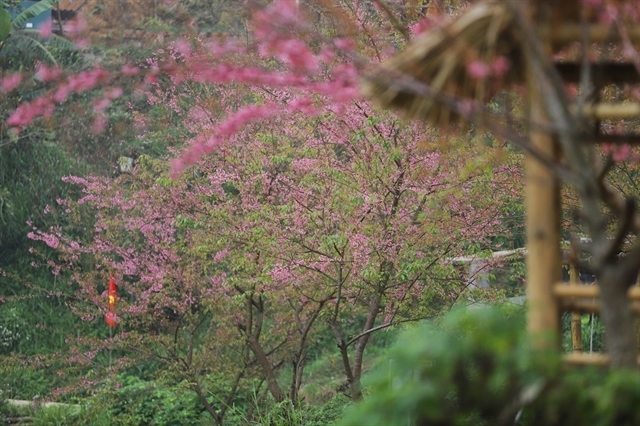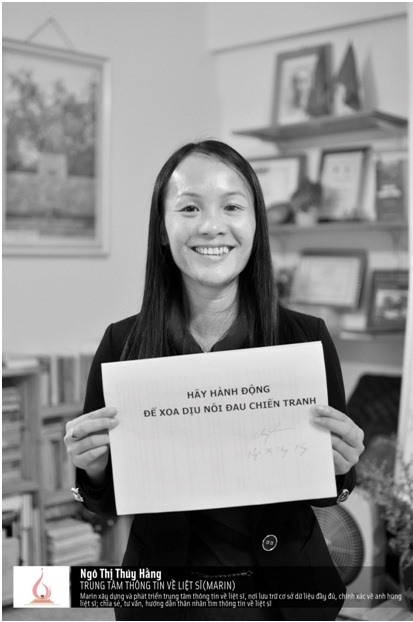 Features
Features

Ngô Thị Thúy Hằng has seemingly forsaken her youth in the quest for martyrs’ remains, leading the Centre of Legal Consultancy and Assistance for Families of Martyrs (MARIN) through a long development journey of trials and tribulations.
 |
| Friend of the war dead: Ngô Thị Thúy Hằng, Founder and Vice director of Centre of Legal Consultancy and Assistance for Families of Martyrs (MARIN). — Photo courtesy of CSIP |
by Nguyễn Hữu Phùng Nguyên
Ngô Thị Thúy Hằng gave up her stable, high-paid job in Hồ Chí Minh City to move to Hà Nội, almost 1,800 kilometres away. She has seemingly forsaken her youth in the quest for martyrs’ remains, leading the Centre of Legal Consultancy and Assistance for Families of War Martyrs (MARIN) through a long development journey of trials and tribulations.
The stable present
Ten years after we first met, Hằng is still a slim woman, but wrinkles have appeared in the corners of her eyes. I was startled to realise that this woman really had spent all her youth on MARIN, forsaking marriage and wealth. Hằng still lives in a rented apartment, with recognition certificates and profiles covering the walls. I know Hằng will never stop that journey.
With Hằng’s ceaseless efforts, www.nhantimdongdoi.org has made great strides, well beyond its original goal.
“We look for each other along the length of our motherland... we look for each other, never to return...” are the words of the song Miền Xa Thẳm (A Faraway Realm) by songwriter Đức Trịnh, which was chosen by Hằng as the background music for the online Vietnamese war martyr monument at www.lietsivietnam.org.
This project started in December 12, 2009, as a permanent remembrance site for heroic martyrs. Here visitors can find information about each individual martyr, with the circumstances and place of their death, and information about living or deceased relatives. Each battle, each front, is reconstructed to provide the circumstance in which the soldiers fell, including the letters and journal entries sent from the most brutal battlefields.
The thoughts and emotions in each word, each digital incense stick and wreath of flowers sent in by the martyrs’ comrades in combat and their families are as real as they are virtual. This not only has value in terms of data and authenticity, but above all, it embeds the unique humane value of MARIN. Over 50,000 martyrs have had their information processed at the online monument and this figure is being updated daily.
Recently, to mark the 69th War Martyrs and Wounded Soldiers Day (27/7/1947-2016), MARIN held a press conference to announce a project it called “Home-coming Day”, having matched names of 172 fallen soldiers to their remains. At the conference, Hằng announced that over the coming five years, it would seek to match the names and remains of 5,000 martyrs to give their families comfort. This major project follows a pilot it launched in 2003. Given the advances in information integration and analysis based on digital technology, MARIN hopes to achieve its goal.
I have had the opportunity to attend many of MARIN’s local mobile counselling sessions for the families of martyrs. These sessions are a part of the Knowledge Dissemination for the Search of War Martyrs project launched and implemented by MARIN since the end of 2008. In Thanh Hóa, Nghệ An, Hà Tĩnh or other provinces where the MARIN team goes, relatives always pack the conference hall. They are still desperate for information on their fallen loved one.
And Hằng, together with other volunteers, provide them with methods to find the martyr from reading the death notices, differentiating between various kinds of death notices, decrypting the unit code to determine exactly the battlefront and the general area where the soldiers fell. Hằng sees the search for martyrs as a jigsaw puzzle and guides the families with pictures and models to help them. The martyr search jigsaw puzzle with dark and light colour arrays and patterns is put together by Hằng in the most approachable and perspicuous way. That is why at each of Hằng’s mobile counseling sessions, there are tears but also smiles of faith and anticipation, of sharing and empathy. Thanks to them, the pain of losing a loved one in war is somehow soothed.
Through ups and downs
It all began at the end of October 2004, when the administrators of the www.nhantimdongdoi.org website received an email from a woman named Ngô Thị Thúy Hằng. She asked for help in finding the grave of her uncle who perished in the war against the French but whose remains were still missing. In addition, Hằng offered: “Call me if you need help editing your news articles...”
Nguyễn Hữu Tuấn, the team leader, immediately contacted Hằng. Tuấn needed someone who could help with editing the website’s articles. Hằng was an editor for the Thời Trang Trẻ (Youth Fashion) magazine in Hồ Chí Minh City at that time. She agreed to help Tuấn.
When Hằng joined the team as an administrator, the information on the website became much more diverse and interesting. Whenever she had free time, instead of going out with friends, Hằng quietly went to martyr cemeteries and searched for information online on her own.
However, feeling that the website needed to be even more professional and upgraded, in August 2006, Hằng gave up her good job in HCM City to move to Hà Nội so that she could contribute more to nhantimdongdoi.org. The first thing Hằng did was to find a legal status for the website.
With the help of many people, by the end of 2006 the Information Centre of War Martyrs (abbreviated as MARIN) under the Union of Applied Information Technology Sciences was founded. Hằng was voted its director.
Hằng wanted to fill the information gaps about the martyrs’ graves on the website herself, and came up with an amazing plan. With her own money, she spent two years carrying her laptop and digital camera around every martyrs’ cemetery in the country, taking pictures of the headstones. The photos were taken during the day, the information would be processed by the evening and updated immediately on nhantimdongdoi.org if an internet connection was available. Hằng thought if she could focus her efforts for two years, she would be able to develop a map of martyrs’ tombs.
Time went by, the student group who founded nhantimdongdoi.org graduated, found employment and one by one got married. By then, they could no longer spare time for nhantimdongdoi.org. Only Hằng remained and continued her fateful relationship with MARIN. The work at the website becam Hằng’s love, and MARIN became Hằng’s family.
At that time, Hằng was working a 9-to-5 job for the communications department of a ceramic tile production corporation in Vĩnh Phúc Province. Hằng rented an old apartment to live and use as MARIN’s office. She took a bus in early morning to go to work and would not come home until late in the evening, when she started her second “job” for MARIN.
However, getting information about fallen soldiers is no easy task. The country has been at peace for more than 40 years, many documents have been lost, many gravestones have been abraded, many memories have faded. Red tape as well as unsympathetic irresponsibility have kept information about the graves and remains of martyrs hidden in dusty drawers or filing cabinets. I have witnessed how much Hằng had to struggle to get her hands on such information. She had to go to localities to meet officials at the Department of Labour, Invalids and Social Affairs, at martyrs’ cemeteries, at the Ministry of Defence, or with anyone who could provide information about the martyrs’ graves.
The intensity of the work was too great, and Hằng just got thinner and thinner. Once, due to overwork, Hằng suffered from stomach-ache, her body grew weak and she had to be hospitalised for several days.
However, feeling that it still wasn’t enough, Hằng decided to quit her job at the ceramic tile company to devote full time to MARIN.
The decision to quit her job created many difficulties, the biggest of which was funding to pay bills and sustain MARIN’s operations. MARIN helped the families of martyrs without charge, while the organisation itself still had to cover many costs.
At the most difficult time, Hằng received a support package in seed capital from the Centre for Social Initiatives Promotion (CSIP). CSIP supported MARIN in the training and enhancing of management skills, as well as communications and networking activities. In addition, CSIP guided Hằng to follow the Social Enterprise model, to operate for the community and still generate revenues to maintain its activities.
To have an independent legal status, in November 2012 the Management Centre of Data Bank about War Martyrs and People with Meritorious Services changed its name to the Centre of Legal Consultancy and Assistance for Families of War Martyrs (MARIN) under the Viet Nam Judicial Support Association for the Poor of the Ministry of Justice. MARIN’s objective is to join hands with the Party and the State to soothe the pain of wars, and repay the debt towards heroic martyrs through legal counseling and assistance for their families in the search for information related to the martyrs.
For more than ten years, I have witnessed the joy of relatives who, thanks to the help of MARIN, have succeeded in finding the exact information about their loved one’s graves. Associate Professor Văn Thị Kim Cúc, lecturer at the Department of Psychology of Ha Noi University of Social Sciences - Viet Nam National University, who is the daughter of war martyr Văn Đình Nhã (from Hương Sơn, Hà Tĩnh) told us:
“My father passed away. The death notice says that he perished in the southern battlefront. Ten years ago I went to look for his grave. We went to Road 9 National War Martyrs’ Cemetery and saw my father’s grave there but we weren’t sure... Through MARIN and the data that the centre had, and cross-checking with the information on the death notice and comparing with the information provided by the Ministry of Defence, my family were able to locate the current burial map. Had it not been for MARIN’s support, all my life I would not have been able to know exactly where my father lay and how he lost his life.”
The case of Cúc was part of the pilot project “Returning the Correct Name to 23 War Martyrs” (from October 2013 to July 2014). The information of these 23 martyrs’ graves in Road 9 National Martyrs’ Cemetery (Quảng Trị) was mismatched. To correct it, MARIN had to go through many procedures and paperwork. Only after nearly nine months with dozens of e-mails and letters and countless phone calls did the martyrs’ graves get the correct identification.
Every additional martyr who is identified and returned to the family means less pain and guilt for the relatives, families and society as a whole. It also means that we are one step further on the path of “easing the pains of war”, the motto MARIN adopted in its early days 10 years ago. VNS
(The story is from Redefining Success, a book published by the Women’s Publishing House, 2017.)




